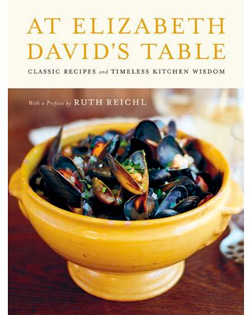A review of At Elizabeth David’s Table & the consequent award of our first Ally.
Last year in Britain the literary estate of Elizabeth David produced the latest iteration of her previously published work in time for Christmas and, predictably, it sold well. This month the book, At Elizabeth David’s Table: Classic Recipes and Timeless Kitchen Wisdom, appears in the United States. This got us to thinking about Mrs. Beeton, Darina Allen, asset exploitation and a new prize.
The Beeton brand passed from her husband to its publishers some years after her untimely death in 1865, and they marketed their asset in a manner that is positively twenty-first century. Subsequent editions of her Book of Household Management added more and more (worse and worse) recipes to appeal to the changing tastes of the British and American middle classes. They, like the readers of Elizabeth David a century later, had developed a yearning for the exotic, and later editions of Household Management obliged them. The book became ever more international and gargantuan, obscuring if not subverting the fact that the first edition of Mrs. Beeton is predominantly English and not at all bad. Each of dozens of subsequent bloated and inferior editions nonetheless made money. The publishers also have recut the book for sale to narrower markets; abridged Beeton, Beeton on puddings, Beeton’s Christmas and other culinary subsets.
Darina Allen is different. She has maintained an admirable integrity over the years. Allen operates the Ballymaloe House, the farm, inn and restaurant in rural Ireland. It sounds like a wonderful place to study and also to dine, and strikes a particular chord in this time of coincident yearning for authentic terroir and limited ‘food miles.’ Allen is no parvenu to these concepts; she took over and expanded both the operation and ethos of Ballymaloe to encompass a cooking school years ago from her mother-in-law Myrtle, who founded the place long before Alice Waters or Fergus Henderson was a proverbial glimmer foodwise, back in 1964.

Reasonably enough, Ballymaloe always has emphasized Irish food, which on inspection appears suspiciously English. Sure enough, Myrtle Allen credits Jane Grigson among her three seminal influences, and Darina has trodden her path. They both sound in print like nice people and hospitable hosts. Between them they have written an excellent book of recipes and repackaged it as over twenty ‘different’ but virtually indistinguishable titles. There also is a collection of gluten free recipes posing as two books. Good for the Allens; if their publisher sees a market, and the public is willing to buy serial installments of the same thing, then they deserve the money. Nobody is holding anybody up.
It is, however, hard to resist poking a little good-natured fun at this phenomenon, and we duly if not predictably have failed in the attempt. Our failure is so abject, in fact, that after pondering this state of affairs we have decided to establish the britishfoodinamerica Allen Award for Creative Recycling.
The inaugural award, to be conferred each year sometime around Easter in obeisance to both its Irish inspiration and the coincidence of the season when our first winner has appeared in the United States, is for the publication of At Elizabeth David’s Table. And the Ally goes to… Jill Norman, for the repackaging coup that is that book.
David, neither a shrinking violet nor a charitable soul, would have loathed ‘At Her Own Table,’ as she somewhat unfairly loathed Mrs. Beeton. She quarreled with everybody, but at the time of her death had not yet fallen out with Norman, who became her literary executor and has guarded David’s considerable reputation and lucrative brand scrupulously. A number of posthumous editions have flown to press, reprints of the originals in glossy new guise and some ‘new’ volumes, including Elizabeth David’s Christmas, comprised of recipes and anecdotes related to a holiday she loathed.
Back At Elizabeth David’s Table; it is a compilation of the easier recipes from her various books, a debased compression of writings that spanned over three decades. The book is padded with full page color photographs of the food described in the recipes without much reference to their original context, which David claimed meant a lot to her. That is debatable, but the new book loses the weird, bossy exoticism that for some reason made David’s work appealing to Britons in the first place, with the publication of Mediterranean Food in 1950. It was fantasy no less than Fantasia: The ingredients she required remained as remote under rationing, still in place in postwar Britain, as magic spells.
David’s Table does include some appealing recipes, including an excellent one for Sussex stewed steak, but the partial compilation jettisons that magic. Most of David’s recipes never deserved their reputation; many are mere sketches, some do not work and their format is inconsistent. This new collection of some of the more pedestrian ones is not worth the money unless you are an aficionado of photographic food porn. Besides, for the same aggregate price you can obtain used copies of the original versions from abebooks.com and other online sources. Fight the power.
The britishfoodinamerica version of Sussex stewed steak appears in the practical.
Editor’s note: In time, the Ally may acquire the stature of the Literary Review’s ‘Bad Sex Prize’ and if so bfia will need a suitable statue to confer upon the winner. Readers are invited to submit renderings.

